One-twelve Ocean Avenue in Amityville, Long Island, New York, is one of the most famous addresses for those interested in both horror and the paranormal. Everyone knows the story of George and Kathy Lutz who purchased the Dutch colonial in December 1975 and moved out only 28 days later. They said that a demonic entity tormented them, causing them to move in haste, leaving most of their property behind. Their experiences were published in a book, The Amityville Horror (1977) written by Jay Anson. Anson’s book was adapted into the 1979 classic horror film of the same name. The film spawned a franchise—16 films both directly or loosely based on the Lutz story. This story isn’t about the Lutzes—it’s about the DeFeos.
The DeFeos were a family of seven who purchased the house in 1965: Ronald DeFeo Sr. and his wife, Louise (nee Brigante), Ronald Jr., Dawn, Allison, Mark, and John. Six members were murdered in their sleep in the wee hours of the morning on November 13, 1974. Ronald DeFeo Jr. eventually confessed to killing his family but changed his story many times over the years. Their story is touched on in the Amityville films. Amityville II: The Possession (1982) is considered a “loose prequel,” based on the book Murder in Amityville (1979) by parapsychologist Hans Holzer. Amityville II is very loosely based on the DeFeo murders.
The DeFeo family was originally from Brooklyn, New York, Ronald DeFeo Sr. worked as a service manager at his wife, Louise’s family’s car dealership, Brigante-Karl Buick in Brooklyn. Ronald Sr. dubbed the family’s home, “High Hopes.” Harvey Aronson, author of High Hopes: The Amityville Murders (1982) explained, “When they moved from Brooklyn and when they bought that house they had High Hopes.” All was not well with the family. Their problems weren’t paranormal.
Ronald DeFeo Sr. was verbally and physically abusive toward his wife and children. Besides Louise, his main target was his eldest child, Ronald Jr., called Butch. Butch DeFeo’s friends were afraid to go to the DeFeo home as some had witnessed Ronald Sr. fly into a rage and either hit Louise or Butch. Butch DeFeo’s friend, Barry Springer said that the DeFeo home was a “crazy house,” and that they were always yelling at each other. Butch was bullied at school where he was beaten up and called fat. His father encouraged him to stand up to the bullies and fight back.
As Butch got older, his temper became worse than his father’s. He and his father often had physical altercations. Butch DeFeo is described as unpredictable; his temper would flare for no reason. His parents became concerned and even sent him to a psychiatrist. After psychiatry failed, they resorted to giving Butch whatever he wanted, including a speedboat. He and his father still had their usual violent fights even as Ronald Sr. placated his son with money and material possessions.
Due to his behavior, Butch was asked to leave Amityville High School at age 17. After leaving school, he began to use LSD and heroin. His behavior became increasingly unpredictable and violent. While he was on a hunting trip with friends, Butch aimed his rifle at a man he knew since childhood. The man left, and when Butch saw his friend later that day, he asked him why he left so soon.
At age 18, he began working for his father and given a weekly paycheck whether or not he showed up for work. Butch worked in the service department doing oil changes, tune-ups, and washes. He admitted that he took advantage of working for the family. He once told a psychiatrist that he could do whatever he wanted on the job because his father was his boss. Deborah Cosantino, a server at The Chatterbox, where Butch DeFeo frequently drank with friends, said that he was usually a nice guy except for when he drank. She recalled him throwing bar stools and pool cues. Sherry Klein, his girlfriend at the time of the murders, also recalls an incident when Butch went to her apartment with some friends. They became very rowdy and when she tried to calm Butch down, he shoved her across the room. She reportedly climbed through a window and went to her parent’s house to get away from him.1
Neighbors described an incident with a woman named Mrs. Nemeth. She said that Butch accused her daughter of throwing rocks at a religious shrine that the DeFeos had in their front yard. When she insisted that her daughter wouldn’t do something like that, Butch became angry and began yelling at her. He said that if she were a man that he’d punch her in the face and that if her husband had a problem he’d punch him in the face. As she walked away, neighbors said he followed her and continued yelling.
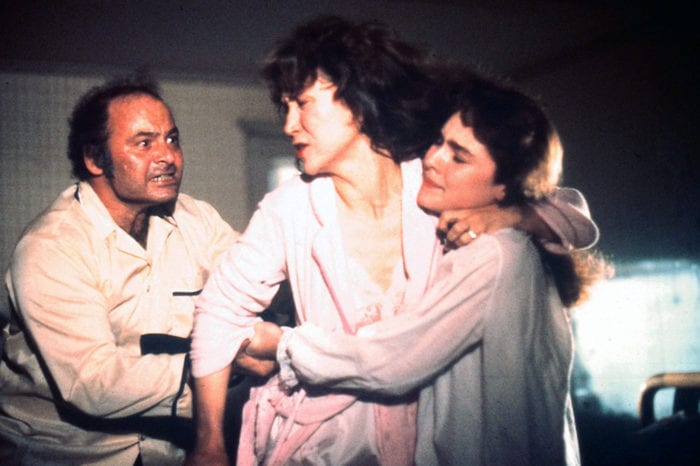
In the weeks leading up to the murder, Butch threatened his father with a gun during an argument. His father trusted him with making a $20,000 deposit for the dealership. Butch said that the money was stolen and his father didn’t believe him. When police questioned Butch about the robbery, he was described as being uncooperative and even violent.
In November of 1974, Butch was 23-years-old and still working for his father. He was on probation at the time. He pled guilty to having a stolen outboard motor. He admitted he kept the job at the dealership because he could come and go as he pleased plus he needed pay stubs to show his probation officer. On November 13, Butch left early for work, stopped at a luncheonette to pass the time as he waited for the dealership to open. He left work early to meet his girlfriend, Sherry Klein. He also met with a friend named Bobby Kelske.
He complained to both throughout the day that he wasn’t able to get in touch with his family. He said that all the cars were in the garage but that no one was answering the phone. He even called home in front of his girlfriend. At 6 PM, he was sitting in Henry’s Bar which was not too far from his house. He tried to call home again and complained to friends about getting no answer. He said that he was going to go home and break into the house through a window. At around 6:30 PM, he returned to the bar. He called out to patrons saying that his parents had been shot. A group of his friends left the bar with him. They went to the house and discovered that the family was dead. A friend of his, Joseph Yessir, called the police.
The bodies of Butch DeFeo’s entire family were found dead, lying in their beds still dressed in their nightclothes. Deputy Chief Medical Examiner, Howard Adelman, would later determine that the DeFeo family bled to death in their beds due to gunshot wounds. The murder weapon was a .35 caliber Marlin rifle. The parents were shot twice and each of the children once.
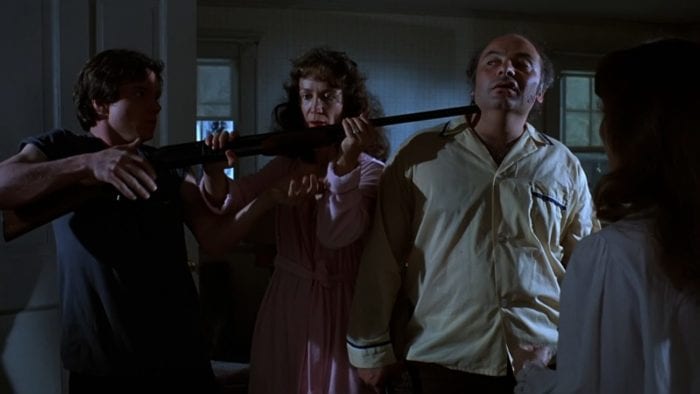
Ronald DeFeo Sr., age 43, was shot twice in the lower back. One bullet exploded into his kidney and exited his right nipple onto the bed. The other entered the base of the spine and was lodged in his neck. DeFeo Sr. could’ve been alive a few seconds to several minutes after being shot. The waistband of his shorts was pulled down a bit indicating that he had moved upward as he died.
Louise DeFeo, age 43, also was shot twice. The bullets entered her right flank and chest. One bullet landed on the mattress and the other came out of the middle of the chest, reentered her left breast, and wrist. The bullets shattered her rib cage, splintered bone, and destroyed most of her right lung, diaphragm, and liver. Although face down, her chest was slightly raised from the bed and her body was turned to the right. The medical examiner said that she could have been alive for several minutes after being shot (perhaps as many as 10). Her position indicated that she may have woken up, raised her upper body off the bed, and possibly looked toward the bedroom doorway in the killer’s direction.
Mark, age 12, and John, age 9, were both shot in the back at close range. The medical examiner determined that the killer stood between the beds less than two feet away. The bullets penetrated the liver, diaphragm, lungs, and heart of each. The bullets went through the boys’ mattresses and into the box springs. John’s spinal cord was severed which may have caused involuntary twitching in the lower body.
Allison, age 13, was shot once in the face from less than two feet away. She may have turned around and saw the muzzle of the gun. The bullet entered her left cheek and moved to her right ear. It then tore into her brain and damaged her skull. The bullet exited, ripped through the mattress, hit the back wall, and ricocheted to the floor.
Dawn, age18, was shot at the back of the neck from two and a half feet away. The bullet entered just below her left ear and blasted through the left temple onto her pillow. The left side of her face collapsed. Brain particles mixed with the blood saturating her pillow.
Butch told police he stayed home from work the day before with an upset stomach. He said that he watched a late-night movie (Castle Keep starring Burt Lancaster) and fell asleep at around 2 AM in the TV room. He awoke at 4 AM with pains in his stomach and said that he saw his brother Mark’s wheelchair outside the bathroom door (his brother broke his leg playing football). He said that he saw the bathroom light on from under the door and heard the toilet flush. He said that he was well-rested from the day before so he decided to go to work. He ate at a luncheonette, went to work, left early, and saw his girlfriend and some friends.
At first Butch claimed the murders had to have been committed by a man named Louis Falini (pseudonym), who Butch said was a mafia hitman. He said that a few years ago, Falini and his wife had lived with his family for a little while after their house burned down in Brooklyn. He said that Falini had a key to the house in which he buried a box of money and jewels. Butch also said that he had a violent argument with Falini after Falini and his wife moved. Falini criticized a paint job that Butch had done for the dealership. He described throwing a brush at Falini, breaking the window behind him. He also said that he called Falini a c*********. He said that his father told him that Falini was a professional hitman and that Butch didn’t know what he had done by calling him names.
Butch also said that two weeks before the murders, during the argument regarding the robbery, his father said that not only did he have to worry about this “phony robbery,” but he also had to worry about losing a friend (meaning Falini). He said that Butch’s argument with Falini put him in a position where he had to tell Falini that if anything happened to Butch, that he was going to kill Falini’s entire family. Butch’s father told him that now, because of Butch, he had to watch out for “Ma and the kids.” 1
As he spoke to investigators, Butch told them about some of his criminal activity. He admitted to burglarizing a neighbor’s home with a friend to steal antiques to sell. He also admitted to using heroin and told them about being on probation. When he was asked about how he was getting away with using drugs on probation, Butch told them that Dawn was providing him with urine samples. He prefaced his confessions by saying that he wanted to be completely honest with them. He kept emphasizing this, meaning that if he’s willing to admit all of these things to the police then he must be telling the truth about the murders. He also added that the police should look for the box that Falini hid. He said that if they found the box empty or didn’t find the box at all, that meant he must have been there. Of course, the police never found the box.
Butch’s grandfather, Michael Brigante Sr., arrived on the scene with his son-in-law, Vincent Procita. They were both asked about Butch and Falini. His grandfather said that he knew Falini and that he was a great guy. He said that he didn’t know where Falini lived and didn’t know his phone number. He’s described as seeming insulted when asked if he thought Falini committed the murders. When asked about his grandson, Brigante said that he was a wonderful grandson and that he was very proud of him. Again, he’s described as insulted when asked if Butch could have committed the murders. Procita didn’t know who Falini was but said that he knew that Butch was involved with drugs. Procita didn’t think Butch was capable of committing the murders.
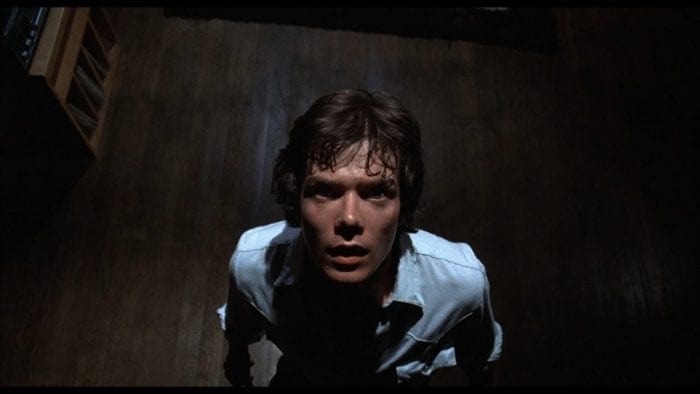
In an interview years later, Butch’s friend, Barry Springer, said that at the time of the murders, Butch had been using drugs for five years and that the drugs were taking their toll on him, making him dangerous. Neighbors describe Butch as a wild teenager who was not “all there.” The thought he did commit the murders.
As police continued searching the DeFeo home, they found the .35 caliber Marlin rifle. It wasn’t among the firearms in Butch’s room but in a separate box with a .22 caliber rifle. Investigators learned that Butch was a gun buff and that, in the weeks leading up to the murders, he was looking to purchase a silencer.
After finding the murder weapon, police focused their investigation on Butch DeFeo. When police questioned him again, Butch continued to insist that they needed to find Falini. When he was asked if he ate dinner with the family that night, they found Butch’s attitude toward his family wasn’t that of a grieving son and big brother. Butch said that he didn’t eat dinner with his family that night. When asked why he said that it was because his mother Louise was a lousy cook and that she made some brown sh*t in a bowl for dinner that he wasn’t going to eat. When asked about his family, he had nothing nice to say. He described his brothers, Mark and John as f***king pigs. He said that he shared a bathroom with them and that they left it a mess usually with toilet paper hanging out of the toilet and sh*t on the back of the seat. When asked about Dawn, which describes her as a fat f***k who played her music too loud. He said that when he yelled at her to turn it down, his father would intervene and hit him. He had nothing to say about Allison. When asked about his grandfather Michael Brigante Sr., Butch called him a “cheap bastard” and said that he took advantage of him and stole from him any chance he got by coming in late to work or leaving early.1
Interestingly, his family has just been killed. You would think someone wouldn’t be focusing on all the negative at that point. Police told him that they had found the murder weapon and the ammo. They also said that his family was determined to have been killed between 3 and 4 AM so they could not have been killed while Butch was at work. Butch then told one of many stories of what happened that night. He said that Falini and an accomplice murdered his family and forced him to watch. Investigators then asked if he was forced to take part in the murders. They asked if the two men forced him to get his hands dirty, so to speak, and kill one of his family members. Butch put his head in his hands and told the investigators to give him a minute. He then said that Fellini and the accomplice weren’t there that night and that it didn’t happen that way. It was then that he confessed to murdering his family.
During his trial, his attorney tried to mount an insanity defense. He claimed that DeFeo heard voices that told him his family was plotting against him. He also claimed he was possessed. At one point, he was shown a picture of his mother and claimed that he didn’t know who she was. He also claimed that he killed them in self-defense. When he first confessed to the murders, he admitted to getting rid of the evidence. He also made sure to call home in front of people he knew and complain to everybody he saw that day that his family was not answering the phone and that he didn’t have keys to get in the house. His behavior shows some organization and planning. He was cognizant of what he’d done. Psychiatrist Daniel Schwartz supported the insanity plea, but Dr. Harold Zolan countered on behalf of the prosecution. Dr. Zolan said that “…although DeFeo was a user of heroin and LSD, he had an antisocial personality disorder and was aware of his actions at the time of the crime.” DeFeo was found guilty of six counts of second-degree murder in November of 1975. He was sentenced to six sentences of 25 years to life. DeFeo filed many appeals and requests to the parole board which were all denied.
During the years, he’s said that his mother committed the murders and that he didn’t want to upset his grandfather by saying that Louise DeFeo was the killer. He also said that a demonic female figure with black hands wearing a black hood handed him the murder weapon. He admitted he was under the influence of drugs in the TV room at the time. DeFeo also eventually admitted to drinking a fifth of scotch daily in addition to the drugs. He described his behavior around the time of the murders as “out of control.” His friend, Barry Springer described him as an “outright junkie.”
He went from blaming his mother to saying that his sister, Dawn was the killer and that he killed her in self-defense. In a prison interview, DeFeo said that the entire family wasn’t supposed to be killed. He said that his father was the only one who “had to go,” and that he was planning on hiring someone to kill him. He said that he would’ve had it happen anywhere other than in the house—most likely in his car. On the night of the murders, he said that he told Dawn that if she wanted to kill their parents to just go ahead and do it. He got her the weapon and told her that it was all ready to go…just pull the trigger. He said that she shot both their parents and that he left the house. When he came back, he said he found their siblings dead. When he confronted Dawn, she pointed the gun at him. He said that he fought with her and that he shot her in self-defense.
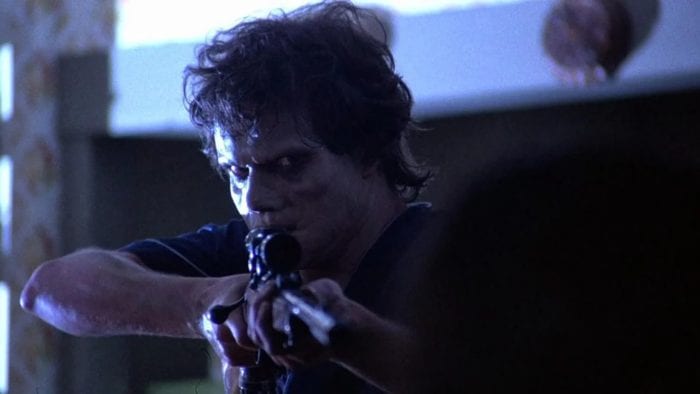
According to the forensic evidence, Dawn had unburned gunpowder on her nightgown which may indicate that she could’ve fired a weapon. Journalist, Rick Moran, gave an interview stating that years after the murders, a DEA agent contacted him. He said that the agent had the DeFeo home under surveillance and that he saw a young woman, dressed in a dark hooded winter jacket leave the house that night. He described her as wearing dark gloves. He said that he saw her throw a rifle into her car and drive away. Moran believes this could account for DeFeo’s story about the hooded female demon with the black hands. He believes that Dawn could’ve killed the family and that Butch killed her. Moran also said that he was one of many reporters on the scene on the night of the murders and that he overheard DeFeo’s grandfather, Brigante Sr., talking to him. Moran said that Brigante told Butch that he didn’t want to hear anything more about Dawn and that he was tired of Butch dragging the family name through the mud. Moran said that Brigante told Butch that he needed to confess to the murders. When asked about whether Dawn could’ve killed the family, Springer said that Dawn was a “bomb ready to go off” because of the abuse that she suffered. He says anything could’ve happened and that Dawn could’ve been the killer.
There are many versions of what happened in Amityville on the morning of November 13, 1974. Ronald DeFeo Jr. has come forward with stories ranging from it being a mob hit, admitting that it was him, to female demons and voices heard in a drug-induced fog, to his mother snapping and killing the family, to his sister Dawn being the killer and him having to kill her in self-defense. Through the years it’s been questioned how six people were killed in their beds by loud shotgun blasts. Was the family drugged? Did DeFeo have an accomplice? He said in a prison interview that he doesn’t know why no one believes his stories. How is it that they think that he acted alone? Forensic evidence indicates that the family was asleep, their time of death determined between 3 and 4 am, no drugs were present in their systems, and there was no sign of a struggle. The medical examiner determined that they were all shot at close range and that Louise DeFeo did wake up and turn around just before she was shot. This indicates that the shots fired on her husband did wake her.
What we do have is a story of a dysfunctional family. A family described as constantly fighting with each other under the thumb of a violent father. Perhaps this served as a pressure cooker for the family’s eldest son. People who knew his family said that he bore the brunt of his father’s abuse. He also was verbally abused and beaten up at school. While it’s certainly not an excuse, being the victim of constant violence since childhood can certainly cause someone to become violent. We also could look to mental illness as a factor. DeFeo’s friend even said that the abuse in the household was so severe that Dawn could’ve snapped. Abuse, mental illness, or a combination of the two, those who knew DeFeo all described him as violent with little provocation.
Whatever happened that night was taken to Ronald DeFeo Jr.’s grave. He passed away on March 12, 2021, at the age of 69. He was still incarcerated at Sullivan Correctional Facility in Fallsburg, New York.
Notes:
1 High Hopes: The Amityville Murders, by Gerard Sullivan and Harvey Aronson, New York: Coward, McCann & Geoghegan, 1981.


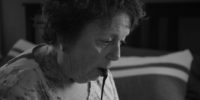

just out of curiosity when the shooting started how come no one could hear it?
Why would you prefer calling it a “portal to hell”?
Also, I built the portal to hell under the stairs mention in the book, as my Dad remodeled their basement. I framed that Triangle space under the stairs. I refuse to read the book because of all the renewed pain the surviving family experienced.
I knew the family. My Dad testified at Butch’s trial, as Butch had worked for him for a short time. The hooded person mentioned was probably his girlfriend. She disappeared right after the murders. Other family members believed she talked Butch into it, as he was easily influenced. What wasn’t mentioned is after claiming it was a mob hit, his other grandfather, Rocco DeFeo paid him a visit and compelled him to confess as he would be killed in jail if he didn’t. Rocco’s brother was high up in the Brooklyn mob. That’s when the insanity stories started. There’s other stuff about the missing money, and what probably led to the murders. I don’t remember any evidence of abuse but I was young when I knew them.
Is there a movie with Ronald defeo in it I’ve been looking for movie
Great article, thank you for that. I read The Amityville Horror when it came out and have seen the original movie ( it’s on cable as I write this) a bunch of times, but I never bothered to look up the original murders. So much speculation! Very intriguing.